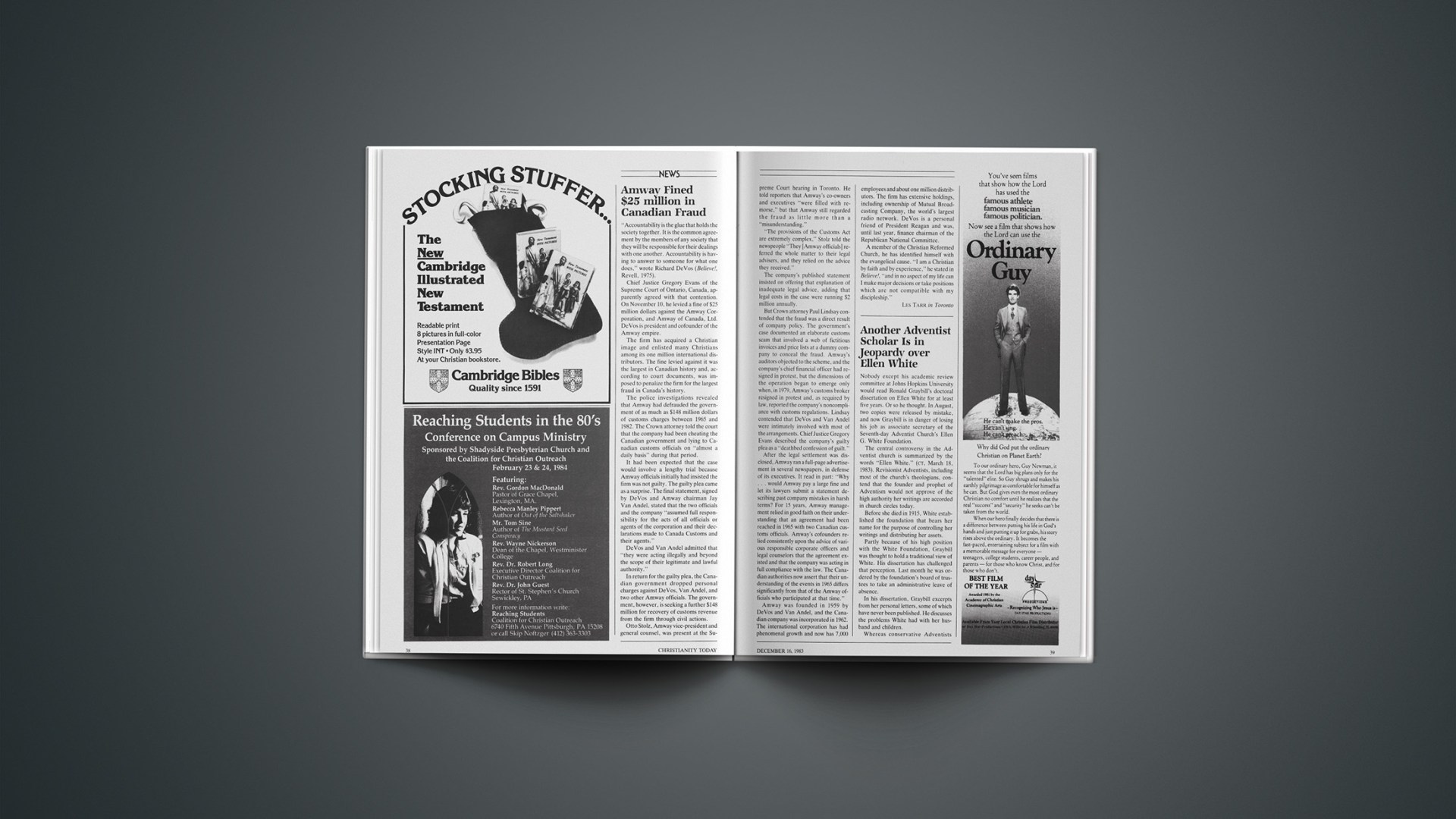“Accountability is the glue that holds the society together. It is the common agreement by the members of any society that they will be responsible for their dealings with one another. Accountability is having to answer to someone for what one does,” wrote Richard DeVos (Believe!, Revell, 1975).
Chief Justice Gregory Evans of the Supreme Court of Ontario, Canada, apparently agreed with that contention. On November 10, he levied a fine of $25 million dollars against the Amway Corporation, and Amway of Canada, Ltd. DeVos is president and cofounder of the Amway empire.
The firm has acquired a Christian image and enlisted many Christians among its one million international distributors. The fine levied against it was the largest in Canadian history and, according to court documents, was imposed to penalize the firm for the largest fraud in Canada’s history.
The police investigations revealed that Amway had defrauded the government of as much as $148 million dollars of customs charges between 1965 and 1982. The Crown attorney told the court that the company had been cheating the Canadian government and lying to Canadian customs officials on “almost a daily basis” during that period.
It had been expected that the case would involve a lengthy trial because Amway officials initially had insisted the firm was not guilty. The guilty plea came as a surprise. The final statement, signed by DeVos and Amway chairman Jay Van Andel, stated that the two officials and the company “assumed full responsibility for the acts of all officials or agents of the corporation and their declarations made to Canada Customs and their agents.”
DeVos and Van Andel admitted that “they were acting illegally and beyond the scope of their legitimate and lawful authority.”
In return for the guilty plea, the Canadian government dropped personal charges against DeVos, Van Andel, and two other Amway officials. The government, however, is seeking a further $148 million for recovery of customs revenue from the firm through civil actions.
Otto Stolz, Amway vice-president and general counsel, was present at the Supreme Court hearing in Toronto. He told reporters that Amway’s co-owners and executives “were filled with remorse,” but that Amway still regarded the fraud as little more than a “misunderstanding.”
“The provisions of the Customs Act are extremely complex,” Stolz told the newspeople “They [Amway officials] referred the whole matter to their legal advisers, and they relied on the advice they received.”
The company’s published statement insisted on offering that explanation of inadequate legal advice, adding that legal costs in the case were running $2 million annually.
But Crown attorney Paul Lindsay contended that the fraud was a direct result of company policy. The government’s case documented an elaborate customs scam that involved a web of fictitious invoices and price lists at a dummy company to conceal the fraud. Amway’s auditors objected to the scheme, and the company’s chief financial officer had resigned in protest, but the dimensions of the operation began to emerge only when, in 1979, Amway’s customs broker resigned in protest and, as required by law, reported the company’s noncompliance with customs regulations. Lindsay contended that DeVos and Van Andel were intimately involved with most of the arrangements. Chief Justice Gregory Evans described the company’s guilty plea as a “deathbed confession of guilt.”
After the legal settlement was disclosed, Amway ran a full-page advertisement in several newspapers, in defense of its executives. It read in part: “Why … would Amway pay a large fine and let its lawyers submit a statement describing past company mistakes in harsh terms? For 15 years, Amway management relied in good faith on their understanding that an agreement had been reached in 1965 with two Canadian customs officials. Amway’s cofounders relied consistently upon the advice of various responsible corporate officers and legal counselors that the agreement existed and that the company was acting in full compliance with the law. The Canadian authorities now assert that their understanding of the events in 1965 differs significantly from that of the Amway officials who participated at that time.”
Amway was founded in 1959 by DeVos and Van Andel, and the Canadian company was incorporated in 1962. The international corporation has had phenomenal growth and now has 7,000 employees and about one million distributors. The firm has extensive holdings, including ownership of Mutual Broadcasting Company, the world’s largest radio network. DeVos is a personal friend of President Reagan and was, until last year, finance chairman of the Republican National Committee.
A member of the Christian Reformed Church, he has identified himself with the evangelical cause. “I am a Christian by faith and by experience,” he stated in Believe!, “and in no aspect of my life can I make major decisions or take positions which are not compatible with my discipleship.”
LES TARRin Toronto










